What to Eat for a Healthy Pregnancy
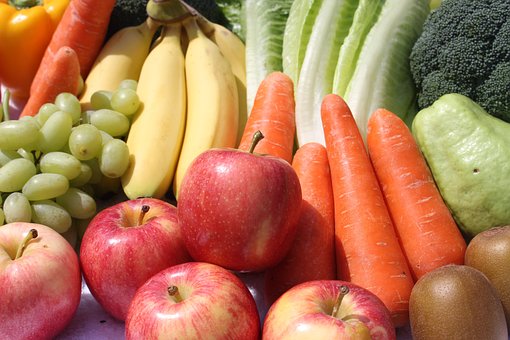
For a fast overview, see this video:
English
Spanish
Get a handy, 1-page, pregnancy diet guide.
English
Spanish
 Water
Water
Always drink plenty of water. Drink enough so that your urine is very light yellow. Water helps every organ of the body work better. Choose it instead of energy drinks or soda.
Vegetables and fruits
All fruit and non-starchy vegetables give you fiber, water, vitamins, minerals and phytochemicals. They are low in calories, so they help women maintain a healthy pregnancy weight. Aim for about three cups of vegetables a day. If you buy canned vegetables, look for “low sodium” or “no salt” on the label. Eat two different fruits each day. If eating canned fruit, make sure it is packed in fruit juice, not syrup.
Low-fat dairy
Eat fat-free or low-fat Greek yogurt, skim milk or 1% milk, calcium-fortified soymilk and reduced-fat cheese. Be sure to look for yogurts that are low in added sugars. Three servings a day should give you the calcium you need to build your baby’s bones while protecting your own. While calcium-fortified almond, oat and coconut milks are good sources of calcium, they lack the protein that cow’s milk and soy milk have.
Whole grains
Whole wheat bread, brown rice, oatmeal and whole-wheat pasta are great choices. Look for the words “whole grain” on cereal boxes. Whole grains give you fiber and vitamins that refined (white) grains lack.
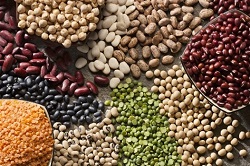
Proteins
Beans
Eat beans, lentils, or split peas 3 to 4 times a week to get iron and fiber. Canned beans and soups should be “low sodium” or “no salt added.”
Nuts and seeds
Eat a small handful of nuts or seeds 4 to 6 times a week. In addition to protein, they provide healthy fat, minerals and vitamin E. Walnuts and flaxseeds (linseeds) are good sources of omega-3 fatty acids, which are needed for brain development.
Lean beef, lamb, pork and poultry
Meat gives you a form of iron that’s easy for your body to absorb. To limit unhealthy saturated fats, eat no more than 6 ounces of meat a day, trim away visible fat, and take the skin off chicken. Avoid breaded and fried meats.
Fish and seafood
Eat fish or seafood once or twice a week to get more brain-boosting omega-3s. Canned salmon, tuna, shrimp, and sardines are lower-cost choices.
If you don’t eat meat, fish, or milk products, get the protein, iron, and zinc from plant sources. For more info on vegan and vegetarian pregnancy diets, go to
English
Spanish
Snacks for Pregnant Moms
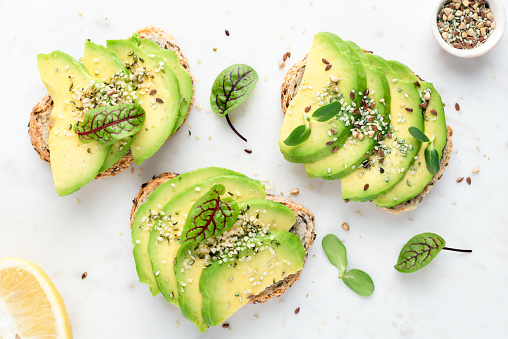
A healthy snack should be low in sugar and salt and include at least two food groups.
For snacks, consider:
- Any fruit or non-starchy vegetable with a cup of low-fat milk
- Avocado on whole-wheat toast or whole-grain crackers
- Hummus and raw veggies, such as baby carrots, tomatoes, celery sticks, and jicama. Get a low-cost hummus recipe here:
English
Spanish - Black bean dip and raw vegetables, such as carrots, tomatoes, celery and raw broccoli. Click here for a black bean dip recipe. (Go to the “language” box at the top right to translate the recipe.)
- Apples slices with peanut butter or sunflower butter
- A hard-boiled egg and a slice of whole-grain bread
- Low-sugar trail mix that includes nuts, peanuts, or pumpkin seeds
- Smoothies made with yogurt and frozen fruit. For a delicious, healthy smoothie recipe:
English
Spanish - Greek yogurt dip and raw veggies, such as broccoli and red pepper strips. For a yogurt dip recipe:
English
Spanish
Eat three small meals and two or three healthy snacks a day. Eating frequent small meals helps pregnant women avoid common pregnancy discomforts such as heartburn, bloating, cravings and constipation.
Foods to Avoid
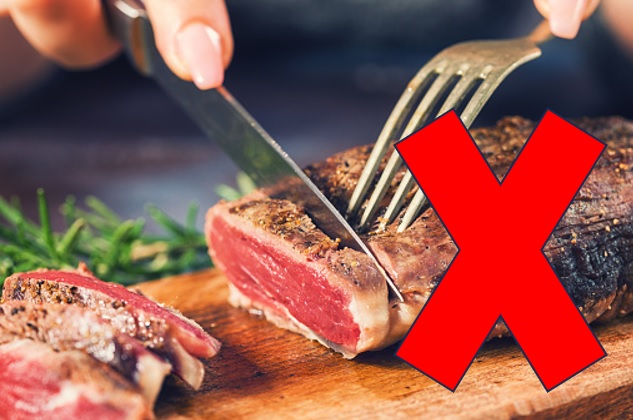
For a dietitian’s advice on foods to avoid or limit during pregnancy, see this video.
English
Spanish
Avoid fish high in mercury
Avoid orange roughy fish, shark, marlin, swordfish, king mackerel and tilefish. Exposure to mercury can cause brain damage to your unborn child. Here’s a one-page guide to safe fish to eat during pregnancy.
English
Spanish
Avoid foods that may give you food poisoning
These foods include:
- Undercooked meats, seafood, and eggs
- Raw cookie dough, cake batter, or other foods that contain raw egg, such as
homemade eggnog and hollandaise sauce - Deli meats and uncooked hot dogs
- Unpasteurized fruit juices, milk, and cheeses such as queso blanco, queso fresco, queso panela, brie, feta, camembert, Roquefort, or blue-veined cheeses
- Unwashed fruits and vegetables
Food poisoning can cause miscarriage and premature birth. To hear about the dangers, go to
English
Spanish
For an easy guide to food safety during pregnancy, go to
English
Spanish
Foods to Limit
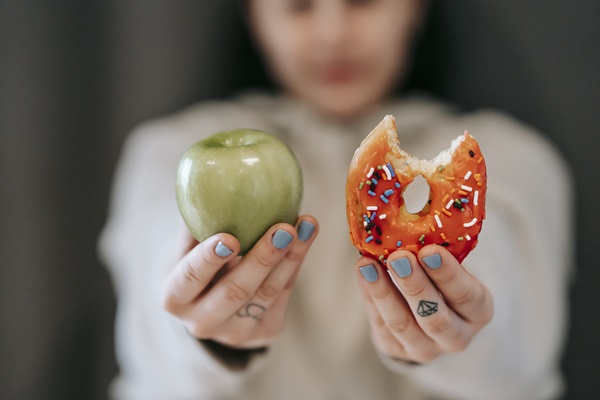
Limit salt
Pregnant women who eat more than 3,700 milligrams of sodium per day have a 54% greater risk of high blood pressure during pregnancy than those who eat 2,600 milligrams of sodium daily. Learn more about salt during pregnancy here.
English
Spanish
Limit sugar
A sugary diet can raise the risk of gestational diabetes, preeclampsia and premature birth. Pregnant women should limit added sugars to about 7 teaspoons (30 grams) or fewer a day. The average American adult eats about 18 teaspoons of added sugar daily. To cut down on sugar, avoid soda, energy drinks, fruit drinks, sports drinks, flavored milks, and sweetened teas and coffees. These beverages account for almost 50% of the excess sugar in the American diet.
Limiting sugar during pregnancy might even help the baby’s brain development! Learn about the connection between excess sugar during pregnancy and children’s brain development here.
English
Spanish
Limit saturated fat
Eating too much saturated fat during pregnancy is linked to pre-eclampsia, gestational diabetes, and preterm delivery. Whether you are pregnant or not, a daily diet high in saturated fat can put you at risk for heart disease. Learn easy ways to limit “sat fat” here.
English
Spanish
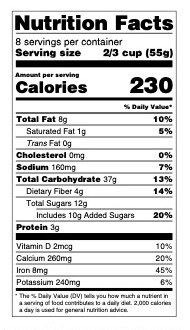
Read the Nutrition Facts
Avoid buying foods too high in salt (sodium), sugar, or saturated fat. Here is a video on how to read a food label.
English
Spanish
You can choose healthier food at fast-food restaurants if you know the Nutrition Facts first. To find fast foods lower in salt, sugar, and saturated fat, go to this website.
English
Spanish
For tips on eating healthier foods in fast food restaurants, click on this video.
English
Spanish
“I know it’s not healthy, but I really want to eat it!”
For tips from a registered dietitian on how to manage your cravings for sweets and other foods during pregnancy, click on this video.
English
Spanish
Make a Plan
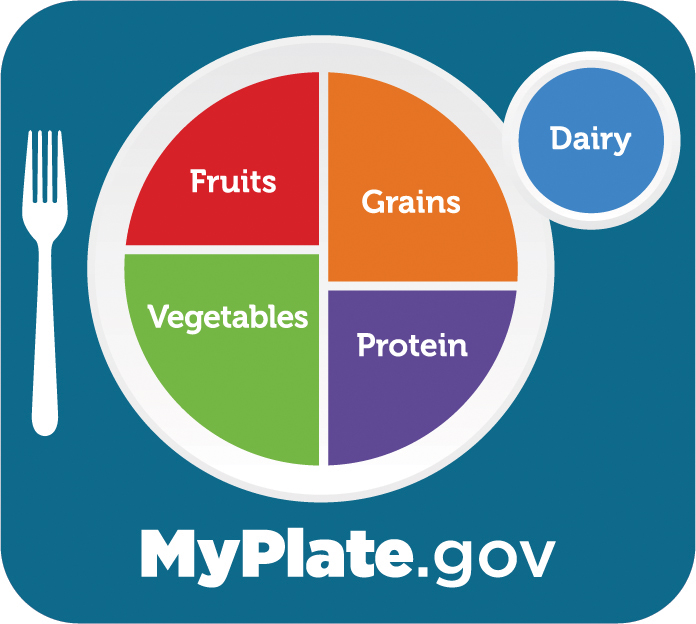
There are lots of things you can do to improve your diet. But it’s hard to know where to begin! A first step is to find out: “How well do I eat already?” Visit the MyPlate.gov website to take a quiz.
The quiz results tell you what you are doing well and what you may need to work on.
The website also has the “Start Simple” app, which helps you set goals and track the number of servings you eat daily from each food group.
Talk to a dietitian
Your doctor may be able to send you to a dietitian for counseling if you feel you need help following a healthy eating plan. Seeing a dietitian is especially important if you have a diet-related pregnancy condition, such as gestational diabetes. A dietitian calculates your calorie needs and makes meal plans you can follow.
Join WIC now!
Dietitians at the WIC Program can assess your diet and help you make diet goals for your general health. WIC (Women, Infants, and Children) is a supplemental nutrition program. WIC provides those foods that are most needed during pregnancy: vegetables and fruit, whole grains, beans and low-fat milk. About 40% of all pregnant women in the United States are eligible for WIC. Pregnant women enrolled in WIC tend to have healthier diets and healthier weight gain during pregnancy. Sadly, only half of eligible pregnant women enroll in this crucial nutrition program before their babies are born.
Find the current income eligibility guidelines here.
English
Spanish

Enroll in WIC as soon as you can. Polk County residents apply here. Access the website in Spanish by clicking on the box that says “language.”

